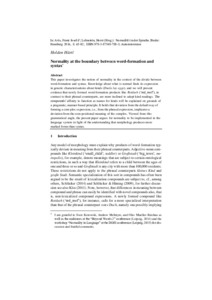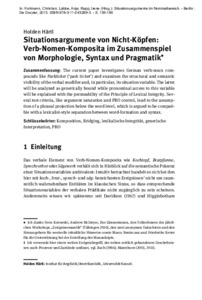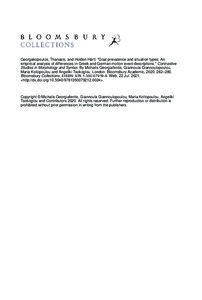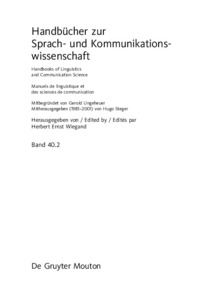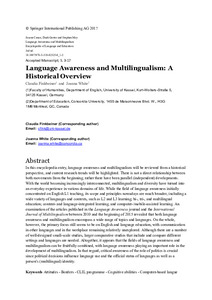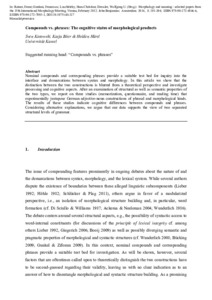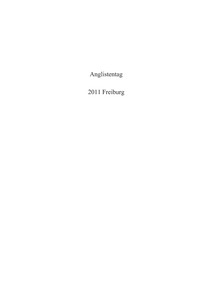Suche
Anzeige der Dokumente 1-7 von 7
Teil eines Buches
 Normality at the boundary between word-formation and syntax
Normality at the boundary between word-formation and syntax
(Buske, 2016)
This paper investigates the notion of normality in the context of the divide between word-formation and syntax. Knowledge about what is normal finds its expression in generic characterizations about kinds (Ducks lay eggs), and we will present evidence that newly formed word-formation products like 'Rotdach' (‘red_roof’), in contrast to their phrasal counterparts, are more inclined to adopt kind readings. The compounds’ affinity to function as names for kinds will be explained on grounds of a pragmatic, manner-based ...
Teil eines Buches
 Situationsargumente von Nicht-Köpfen: Verb-Nomen-Komposita im Zusammenspiel von Morphologie, Syntax und Pragmatik
Situationsargumente von Nicht-Köpfen: Verb-Nomen-Komposita im Zusammenspiel von Morphologie, Syntax und Pragmatik
(De Gruyter, 2015)
The current paper investigates German verb-noun compounds like Parkticket (‘park ticket’) and examines the structural and semantic visibility of the verbal modifier and, in particular, its situation variable. The latter will be analyzed as generically bound while pronominal access to this variable will be explained with the permeability of the Principle of Lexical Integrity. Several test criteria, like argument saturation and PRO control, lead to the assumption of a phrasal projection below the word level, which is ...
Teil eines Buches
 Goal prevalence and situation types: An empirical analysis of differences in Greek and German motion event descriptions
Goal prevalence and situation types: An empirical analysis of differences in Greek and German motion event descriptions
(Bloomsbury Academic, 2020)
The aim of the current study is to investigate crosslinguistic differences in the encoding of motion events and the distribution of their constituent parts, that is, the manner as well as the path focusing mainly on the Goal component. In the abundant literature on the effect of the lexicalization pattern of a language (Satellite- versus Verb-framed), only a few studies have systematically taken into account the specific properties of the situation underlying a verbalization. With a focus on German and Greek, we ...
Teil eines Buches
 Argument-structural restrictions on word-formation patterns
Argument-structural restrictions on word-formation patterns
(De Gruyter Mouton, 2015)
The implementation of argument-structural effects on word-formation is a vital aspect in modeling the lexical system and the interface between morphology and syntax. The current article provides an overview of theoretical perspectives in the field and presents analyses of structural principles holding in the domain. A number of test cases relating to fundamental operations, e.g., in compounding and nominalization are discussed, as well as specific conditions restricting the formation of morphologically complex words.
Teil eines Buches
 Language Awareness and Multilingualism: A Historical Overview
Language Awareness and Multilingualism: A Historical Overview
(Springer, 2017-05-20)
In this encyclopedia entry, language awareness and multilingualism will be reviewed from a historical perspective, and current research trends will be highlighted. There is not a direct relationship between both movements from the beginning; rather there have been parallel (independent) developments. With the world becoming increasingly interconnected, multilingualism and diversity have turned into an everyday experience in various domains of life. While the field of language awareness initially concentrated on English ...
Teil eines Buches
 Compounds vs. phrases: The cognitive status of morphological products
Compounds vs. phrases: The cognitive status of morphological products
(John Benjamins, 2014)
Nominal compounds and corresponding phrases provide a suitable test bed for inquiry into the interface and demarcations between syntax and morphology. In this article we show that the distinction between the two constructions is blurred from a theoretical perspective and investigate processing and cognitive aspects. After an examination of structural as well as semantic properties of the two types, we report on three studies (memorization, questionnaire, and reading time) that experimentally juxtapose German ...
Teil eines Buches
 Nominal composition and the demarcation between morphology and syntax: Grammatical, variational, and cognitive factors
Nominal composition and the demarcation between morphology and syntax: Grammatical, variational, and cognitive factors
(WVT Wissenschaftlicher Verlag Trier, 2012)
In this paper, the authors investigate nominal compounds in English and German against the background of the debate about the boundary between morphological and syntactic structure building in language. After an examination of grammatical, variational as well as functional differences between compounds and phrases, they focus on processing factors to disentangle cognitive differences between the two domains. Crucially, the authors report on three experimental studies, which are designed to reveal contrasts in the ...

